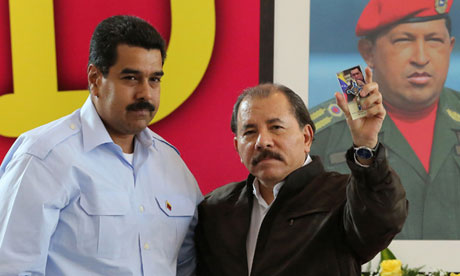Alfred Vierling » in english » Interfering with the right to seek asylum (by Snowden) is a serious problem in international law
Interfering with the right to seek asylum (by Snowden) is a serious problem in international law
US attempts to block Edward Snowden are ‘bolstering’ case for asylum
As Venezuela and Nicaragua offer help to whistleblower, experts say US actions are strengthening his case for safe haven by Jamie Doward The Observer, Sunday 7 July 2013 Photograph: Inti Ocon/AFP/Getty
Attempts by the US to close down intelligence whistleblower Edward Snowden’s asylum options are strengthening his case to seek a safe harbour outside of Russia, legal experts claim.
Snowden, who is believed to be in the transit area of Moscow’s Sheremetyevo airport, has received provisional offers of asylum from Nicaragua and Venezuela, and last night Bolivia also offered him sanctuary. He has applied to at least six other countries, says the Wikileaks organisation providing legal support.
Michael Bochenek, director of law and policy at Amnesty International, said the American government’s actions were bolstering Snowden’s case. He said claims that the US had sought to reroute the plane of Bolivia’s president, Evo Morales, amid reports that the fugitive former analyst for the National Security Agency was on board, and suggestions that vice-president Joe Biden had phoned the Ecuadorean leader, Rafael Correa, to block asylum for Snowden, carried serious implications.
“Interfering with the right to seek asylum (by Snowden) is a serious problem in international law” Bochenek said. “It is further evidence that he [Snowden] has a well-founded fear of persecution. This will be relevant to any state when considering an application. International law says that somebody who fears persecution should not be returned to that country.”
Venezuela’s extradition treaties with the US contain clauses that allow it to reject requests if it believes they are politically motivated. The country’s president, Nicolas Maduro, has praised Snowden for being a “young man who told the truth” and has criticised European countries’ alleged role in the rerouting of Morales’s plane last week .
“The European people have seen the cowardice and the weakness of their governments, which now look like colonies of the US,” he said on Friday.
Spain said it had been warned that Snowden was on the Bolivian presidential plane, the first acknowledgement that the manhunt was linked to the plane’s diversion to Austria. Foreign minister José Manuel Garcia-Margallo said: “They told us that the information was clear, that he was inside.” He did not say who “they” were or whether he had been in contact with the US.
Speaking from Buenos Aires, Bochenek said the US actions were transforming the Snowden affair into a global saga. “In PR terms, opinion here and elsewhere in Latin America has shifted precisely because of the appearance of interference with other governments’ decision-making processes,” he said.
Bochenek said there was no reason why Snowden could not be granted asylum without setting foot in the country that had granted him refuge. The need to be present in the country where asylum is granted is a convention that can be ignored if nations see fit, he said.
“It’s true that a lot of states have that as a rule in their own domestic requirements, but it is not required by international law,” he said.
Neither did placing Snowden on an Interpol “red flag” list mean that states had to hand him over to the US. The procedure is an advisory measure that can be ignored, legal experts said.
A decision to give Snowden refuge has political consequences for Maduro, and provides his critics with ammunition.
Venezuela’s opposition leader, Henrique Capriles, has accused Maduro of using Snowden to distract voters from economic woes at home. “Nicolas, you can’t use asylum to cover up that you stole the election. That doesn’t give you legitimacy, nor make the people forget,” he said on Twitter.
Nicaragua’s president, Daniel Ortega, said he was willing to offer asylum, “if circumstances allow it”, although he did not say what the circumstances would be. Venezuela, though, appears a more likely host.
“Asylum for Snowden in Venezuela would be the best solution,” Alexei Pushkov, chairman of the international affairs committee of Russia’s lower house of parliament, said on Twitter. “That country is in a sharp conflict with the US.”
However, there are no direct commercial flights between Moscow and Caracas, and the usual route involves changing planes in Havana.
It is not clear whether the Cuban authorities would grant Snowden transit. However, Cuba has expressed sympathy for Snowden’s situation and accused the US of “trampling” on other states’ sovereignty.
Filed under: in english













Recent Comments